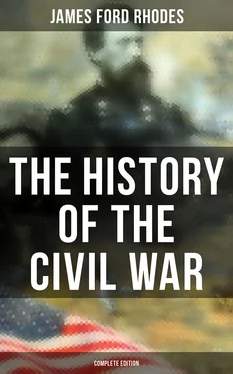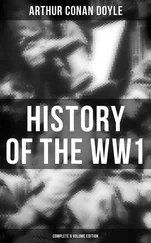James Ford Rhodes - The History of the Civil War (Complete Edition)
Здесь есть возможность читать онлайн «James Ford Rhodes - The History of the Civil War (Complete Edition)» — ознакомительный отрывок электронной книги совершенно бесплатно, а после прочтения отрывка купить полную версию. В некоторых случаях можно слушать аудио, скачать через торрент в формате fb2 и присутствует краткое содержание. Жанр: unrecognised, на английском языке. Описание произведения, (предисловие) а так же отзывы посетителей доступны на портале библиотеки ЛибКат.
- Название:The History of the Civil War (Complete Edition)
- Автор:
- Жанр:
- Год:неизвестен
- ISBN:нет данных
- Рейтинг книги:5 / 5. Голосов: 1
-
Избранное:Добавить в избранное
- Отзывы:
-
Ваша оценка:
- 100
- 1
- 2
- 3
- 4
- 5
The History of the Civil War (Complete Edition): краткое содержание, описание и аннотация
Предлагаем к чтению аннотацию, описание, краткое содержание или предисловие (зависит от того, что написал сам автор книги «The History of the Civil War (Complete Edition)»). Если вы не нашли необходимую информацию о книге — напишите в комментариях, мы постараемся отыскать её.
This Pulitzer Prize winning book remains one of the best histories on the topic of American Civil War to this day. For the purpose of writing this comprehensive work, the author used the most authoritative documents and sources including Personal Traits of Lincoln, Life and Letters of General Meade, Diary of Gideon Welles, The Reminiscences of Carl Schurz and Official Records of the Union and Confederate Navies.
The History of the Civil War (Complete Edition) — читать онлайн ознакомительный отрывок
Ниже представлен текст книги, разбитый по страницам. Система сохранения места последней прочитанной страницы, позволяет с удобством читать онлайн бесплатно книгу «The History of the Civil War (Complete Edition)», без необходимости каждый раз заново искать на чём Вы остановились. Поставьте закладку, и сможете в любой момент перейти на страницу, на которой закончили чтение.
Интервал:
Закладка:
One of McClellan's limitations, however, came early into view. Although personally courageous, he feared reverses for his army. Moreover, either his intelligence of the enemy was defective or his inferences from such accurate information as he possessed were radically unsound. In August, he was haunted by the notion that the Confederates largely outnumbered him; that they would attack his position on the Virginia side of the Potomac and also cross the river north of Washington. At this time, however, Johnston did not purpose either movement; he was chafing at the smallness of his force, the lack of food and ammunition, the disorganization and sickness amongst his troops. During the month of September and well into October, he was encamped about Fairfax Court-house with strong outposts on hills six and a half miles from Washington, where the Confederate flag could be plainly seen by the President and his General. On October 19, he withdrew his army to Centreville and Manassas Junction, farther from Washington but a much stronger position.
"The great object to be accomplished," wrote McClellan to the Secretary of War shortly after October 27, "is the crushing defeat of the rebel army now at Manassas." 16The Union troops were sufficient in number and fighting quality to accomplish it. All the authorities agree that McClellan's organization of the Army of the Potomac was little short of magical. The training to fit men for active service generally required six months; under McClellan it had been accomplished in three. The change from the "grand army" before the battle of Bull Run to McClellan's Army of the Potomac, according to William H. Russell, was marvellous. The soldiers of July, who, in his opinion, could have been overcome by one-third their number of British regulars, were in September perhaps as fine "a body of men in all respects of physique" as had ever "been assembled by any power in the world." 17
When McClellan and McDowell rode together from camp to camp on the south side of the Potomac, McClellan used to point toward Manassas and say, "We shall strike them there." What might have been is doubtless as unprofitable a subject of speculation in war as in the other affairs of life; but it is a fact of importance that during the autumn the President and the country rightly began to lose confidence in McClellan's military ability. They had good reason for this distrust. His apology in his report of August 4, 1863, 18and in his "Own Story" receive little justification from the pitiless contemporary record and from other facts since brought to light. On October 27, according to his own account, his effective force was 134,000; "the number disposable for an advance," 76,000: 19Johnston had 41,000. The Union artillery was superior; the infantry had better arms. The health of the Union army was good, that of the Confederate bad. The weather was fine and dry; up to Christmas the roads were in suitable condition for military operations. On the other hand, the Confederates had an immense advantage in the moral effect of their victories at Bull Run and Ball's Bluff. 20Nevertheless, the officers and men of the Army of the Potomac were devoted to McClellan and eager to fight. They would have been glad to follow if he would lead; it only remained for him to give the word.
The Confederate were little, if any, better disciplined than the Union soldiers; but their cautions general was willing to take the offensive. Give me 19,000 more men as good as the 41,000 that I have with the necessary "transportation and munitions of war," said Johnston to President Davis on October 1, and I will "cross the Potomac and carry the war into the enemy's country": 21at that time he knew that the Union force was superior in number.
When McClellan wrote as military critic he condemned by implication his own inactivity as commander. "I am induced to believe," he wrote to General Scott from Washington on August 8, "that the enemy has at least 100,000 men in front of us. Were I in Beauregard's place, 22with that force at my disposal, I would attack the positions on the other side of the Potomac and at the same time cross the river above this city in force." 23Yet McClellan himself, with at least 76,000 to 41,000 of the enemy, would not make in November a movement similar to, but not so extended as, the one he laid down for the Confederates in August. I am "not such a fool," he said to the President, "as to buck against Manassas in the spot designated by the foe." 24
To judge from McClellan's private letters at this time, he seemed to think that the men in authority were endeavoring to add difficulties to his task. "I am thwarted and deceived by these incapables at every turn," he wrote. 25As a matter of fact, everybody "from the President to the humblest orderly who waited at his door" 26was helping him according to his means. The fault was not of the President, the Cabinet, General Scott or the senators; it was entirely his own. McClellan fed himself upon the delusion that the enemy had 150,000 men. This estimate would indeed have justified his inaction; but, after an evening's conversation with him "it became painfully evident" to John Hay, "that he had no plan." 27
The President's attitude towards his General was sublime. They talked sadly over the disaster at Ball's Bluff. Alluding to the death of Colonel Baker, McClellan said: "There is many a good fellow who wears the shoulder-straps going under the sod before this thing is over. There is no loss too great to be repaired. If I should get knocked on the head, Mr. President, you will put another man immediately in my shoes." "I want you to take care of yourself," was the reply. 28
On the evening of October 26, "the Jacobin Club represented by Senators Trumbull, Chandler and Wade came up to worry the administration into a battle. The agitation of the summer is to be renewed," wrote Hay. "The President defended McClellan's deliberateness." On going over to the General's headquarters the "Jacobins" were discussed. "The President deprecated this new manifestation of popular impatience but said it was a reality and should be taken into the account:-'At the same time, General, you must not fight till you are ready.' 'I have everything at stake,' replied McClellan; 'if I fail I will not see you again or anybody.' 'I have a notion to go out with you,' said Lincoln, 'and stand or fall with the battle.'" 29
On October 31, Scott voluntarily retired from active service and McClellan succeeded him in the command of all the armies of the United States. Next evening, at his headquarters, he read to Lincoln and Hay his General Order in regard to Scott's resignation and his own assumption of command. The President said, "I should be perfectly satisfied if I thought that this vast increase of responsibility would not embarrass you." "It is a great relief, Sir!" replied McClellan, between whom and Scott there had been friction. "I feel as if several tons were taken from my shoulders to-day. I am now in contact with you and the Secretary. I am not embarrassed by intervention." "Well," rejoined Lincoln, "draw on me for all the sense I have and all the information. In addition to your present command, the supreme command of the army will entail a vast labor upon you." "I can do it all," said McClellan quietly. 30
The country had a right to expect an offensive movement. Inasmuch as McClellan was apt to underestimate the number as well as the fighting quality of his soldiers, his 76,000 "disposable for an advance" could likely enough have been increased to 100,000. He ought to have fought Johnston, or manœuvred him out of Manassas, or raised the Confederate blockade of the lower Potomac or taken Norfolk. 31Any one of these movements attempted in the autumn of 1861 would have satisfied the country and maintained their confidence, as well as the President's, in McClellan; and this would have been an asset of great value. But he was no fighter and at this time could not have handled 100,000 men. It is doubtful if any other general in the Union army could have done so. Long after the war, Grant referred to the "vast and cruel responsibility" devolving upon McClellan at the outset and added, "If McClellan had gone into the war as Sherman, Thomas or Meade, had fought his way along and up, I have no reason to suppose that he would not have won as high a distinction as any of us." 32In McClellan's army was Colonel William T. Sherman, who in 1864 led an army of 100,000 with great ability; but at this time he told the President that his "extreme desire" was "to serve in a subordinate capacity and in no event to be left in a superior command." 33To march, manœuvre, feed and fight to the best advantage an army of 100,000 comes near being the highest executive achievement of which man is capable. 34Joseph E. Johnston "quiet and sad" 35thought that he could now conduct 60,000 in an offensive campaign, but he had had the invaluable experience of commanding half that number at Bull Run.
Читать дальшеИнтервал:
Закладка:
Похожие книги на «The History of the Civil War (Complete Edition)»
Представляем Вашему вниманию похожие книги на «The History of the Civil War (Complete Edition)» списком для выбора. Мы отобрали схожую по названию и смыслу литературу в надежде предоставить читателям больше вариантов отыскать новые, интересные, ещё непрочитанные произведения.
Обсуждение, отзывы о книге «The History of the Civil War (Complete Edition)» и просто собственные мнения читателей. Оставьте ваши комментарии, напишите, что Вы думаете о произведении, его смысле или главных героях. Укажите что конкретно понравилось, а что нет, и почему Вы так считаете.












